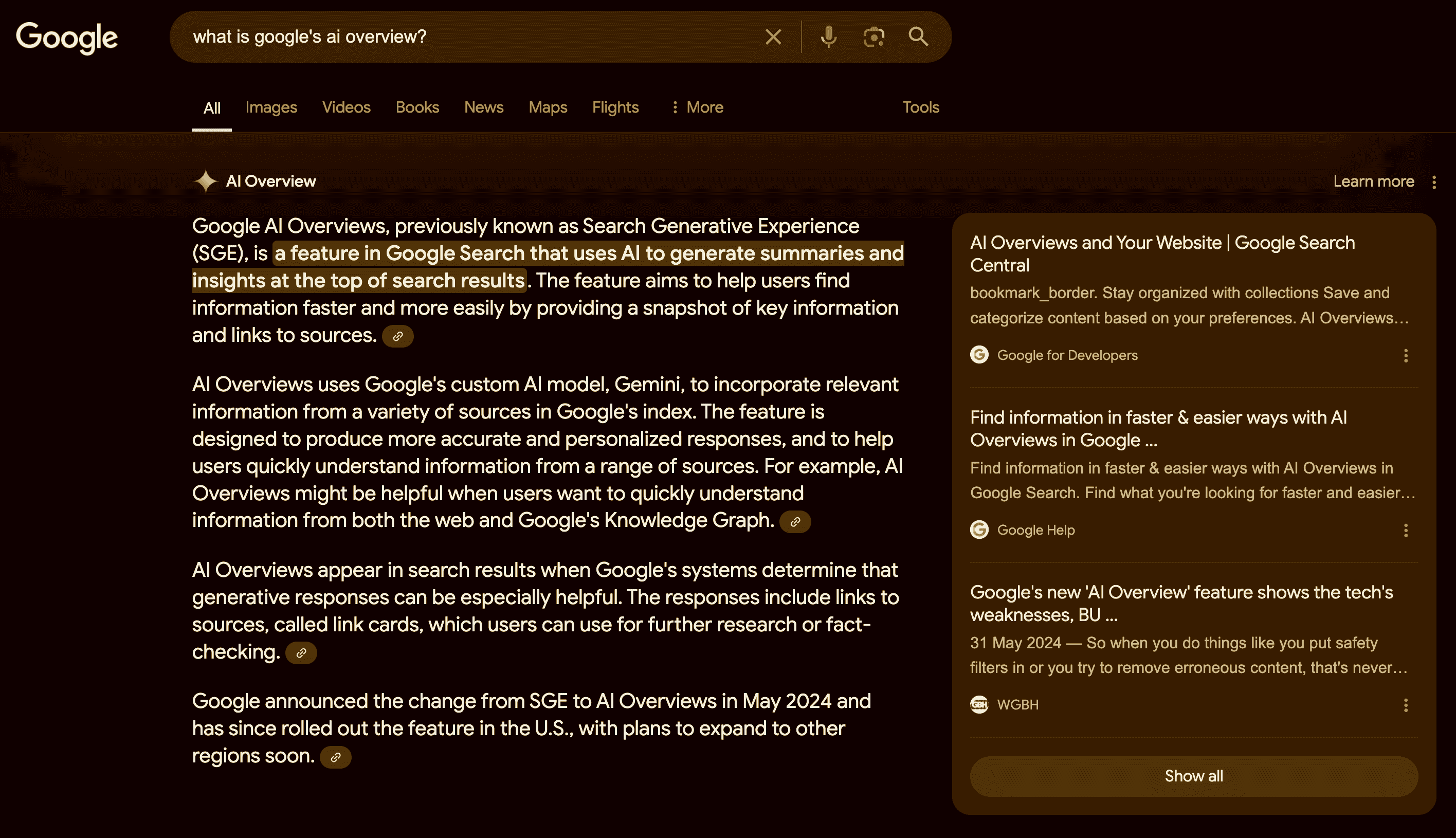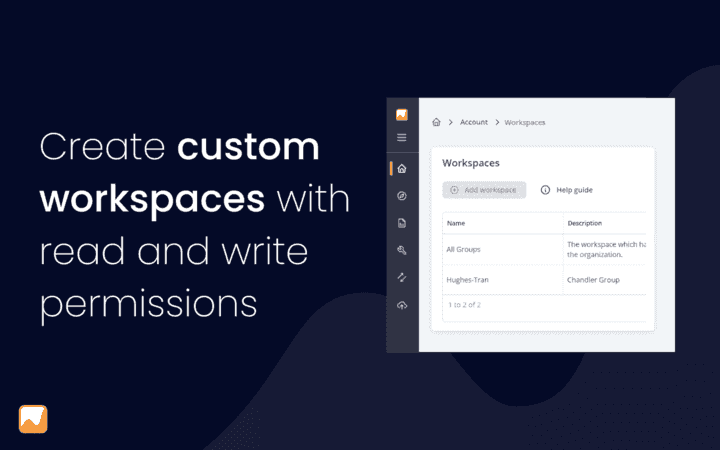9 PROVEN Blogging Tips for Beginners in 2023
Last updated on Thursday, November 9, 2023
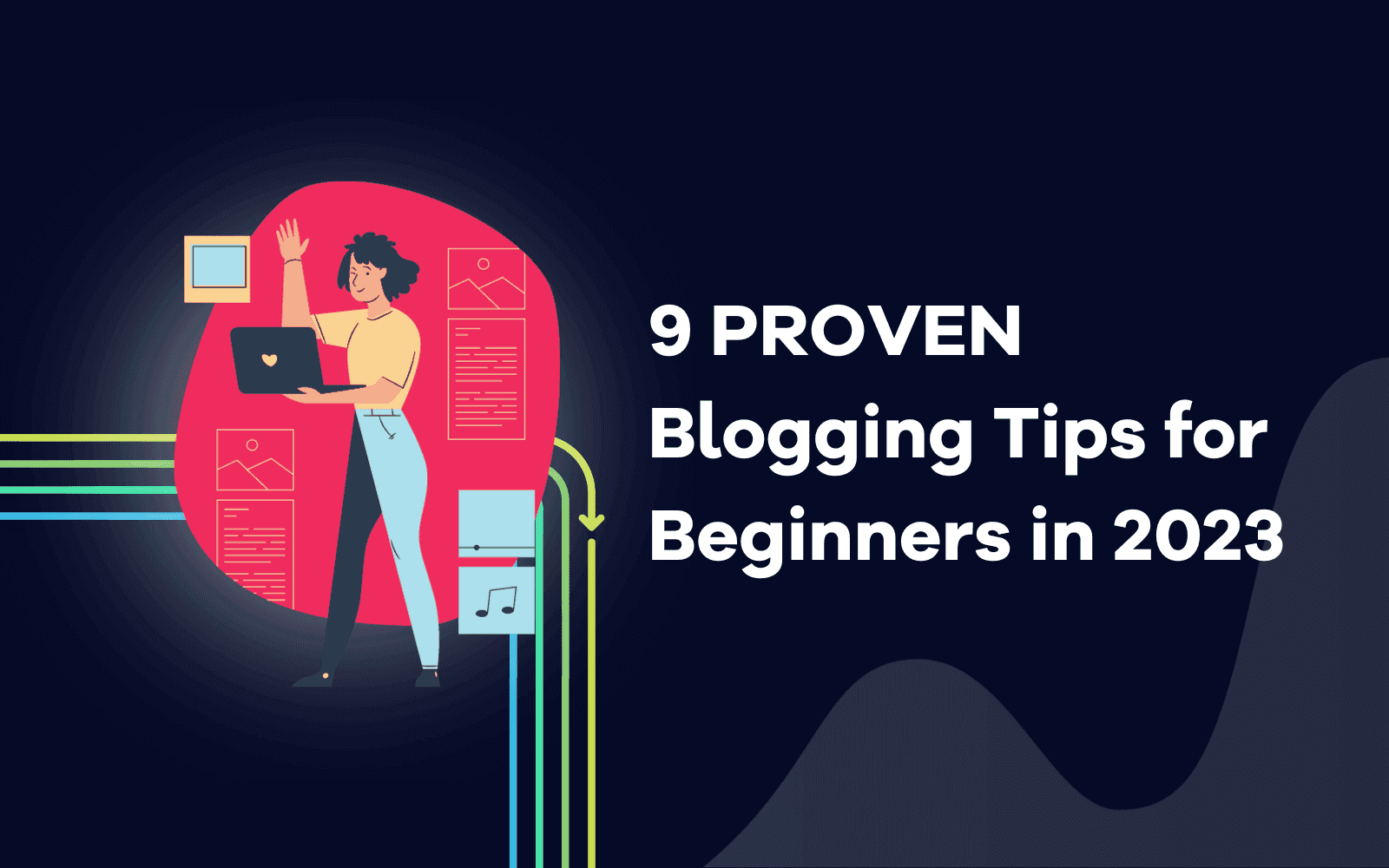
Imagine what it would be like to have a successful blog finally.
Where you’re able to share your knowledge and expertise with the world, connect with people who share your interests, and even make money from your blog.
It's possible.
However, for a beginner blogger, navigating the deep waters of blogging can be challenging.
In this post, I will share 9 proven blogging tips for beginners.
These tips will help you start, grow, and monetize your blog, even if you're learning how to start a blog for the first time.
Let’s get started.
#1. Defining Your Blogging Niche
One of the proven blogging tips for beginners is to choose a niche.
A blog niche is the main topic or specific subject that you’re going to create content around on your blog.
This is important as it will help you attract readers who share common interests around your chosen niche.
There are many benefits to choosing a niche for your blog from the onset.
Here are important reasons why niche selection is vital in blogging for beginners.
It helps you focus your content on a specific group which enables you to create content your audience will love to read and share.
Selecting a niche helps you differentiate yourself from the crowded blogging world.
Helps to establish your blog as a trusted source of information.
You can attract and retain a specific group of people who are interested in your area of focus.
Niche blogs have better monetization opportunities than general blogs.
According to Semrush, a successful blogging niche should take into consideration the following key components:
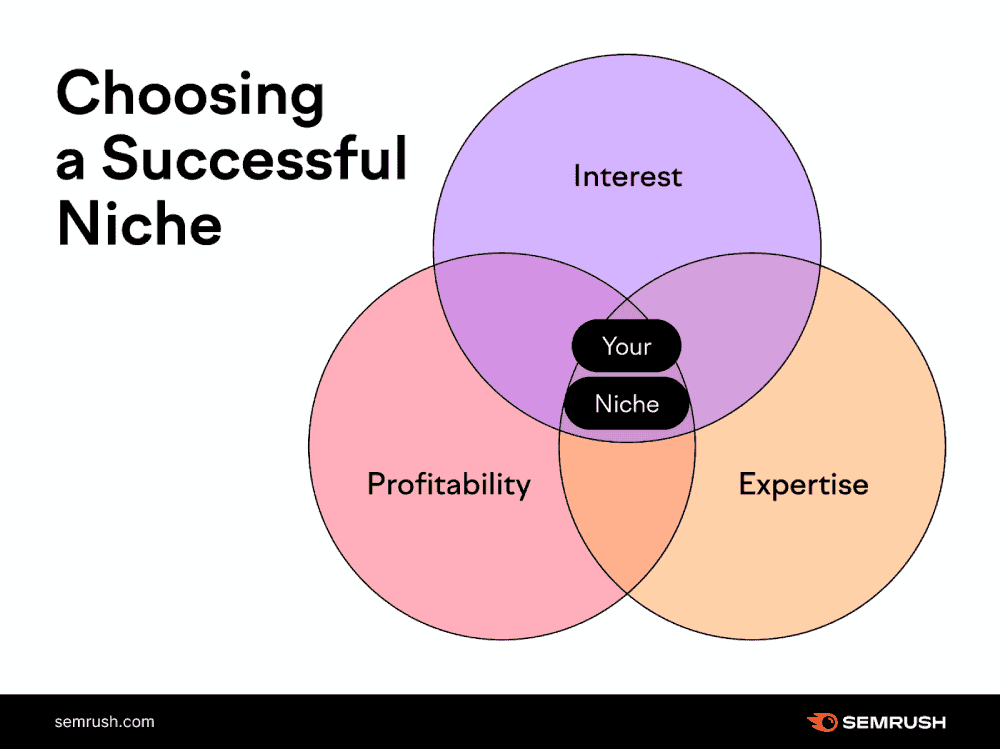
Here are essential steps to help you identify your blogging niche:
Choose a niche aligned with your passions and knowledge to sustain long-term interest and expertise.
Evaluate potential revenue streams and monetization opportunities within your chosen niche.
Test and validate your chosen niche by creating a few blog posts to see your audience’s reaction before fully committing to it.
#2. Create a Killer Content Strategy
Once you define your blog’s niche, the next thing in my practical blog writing tips is to document a successful content strategy.
One of the common blogging mistakes you need to avoid as a new blogger is to try to cover every blogging topic you think about.
A content strategy will be your blogging compass or road map that guides your blogging journey to achieve your goals.
It enables you to create engaging and valuable content that attracts traffic to your blog.
Here are important reasons to have a documented content strategy when blogging:
It enables you to create purposeful blogging content while staying in line with your blogging goals and the needs of your target readers.
It enables you to know what types of blog content to create, when, and where to promote it.
It enables you to understand which types of content perform better for your blog.
Here are tips for building a content strategy for your blog:
Keep your target readers in mind.
Determine what you want to achieve with your blog.
Define the metrics to measure performance.
Decide the resources and budget you need.
#3. Create High-Quality Content
Creating high-quality content is the cornerstone of a successful blog.
It’s one of the blogging tricks successful bloggers use to attract readers and keep their attention.
High-quality content engages your readers and enhances your blog’s credibility and search engine rankings.
This is mainly because people love content that provides valuable insights and practical solutions and entertains them.
In fact, according to a GrowthBadger survey, quality content is among the key factors for making a blog successful for both low-income bloggers and those earning over $50K per year.
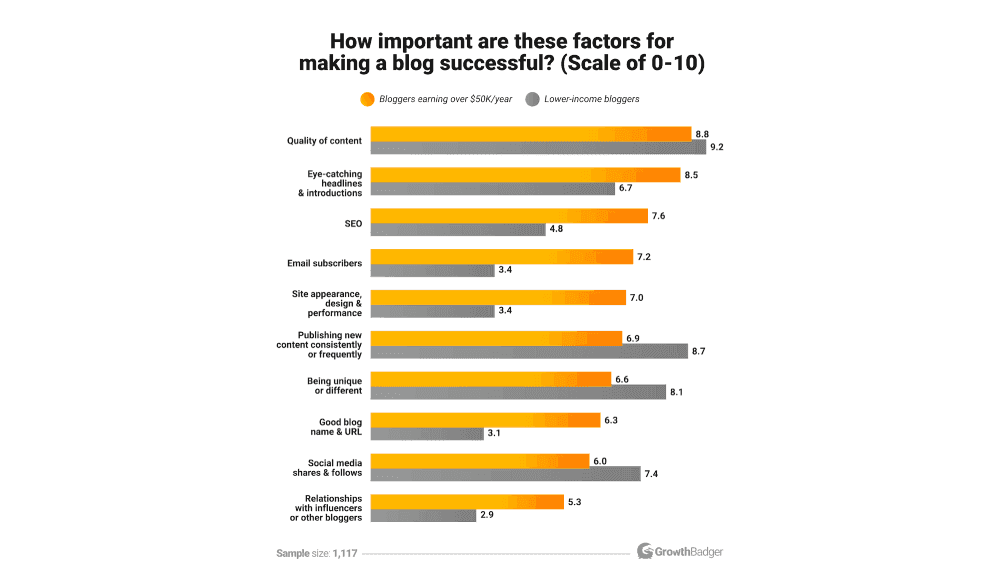
Source: GrowthBadger
However, crafting engaging blog posts is still the top challenge for people learning how to start a blog.
Here are tips to produce high-quality content for your blog:
Organize your content into clear sections with headings and subheadings. Use bulleted points and numbered lists to improve readability.
Use compelling introductions to grab your readers’ attention from the beginning.
Create a swipe file to improve your copywriting skills.
Offer practical advice or actionable information that readers can apply right away.
Make your content visually appealing by using high-quality images, videos, and infographics.
Craft compelling headlines
Avoid plagiarism by creating content from scratch. If you use a quote, statistics, or information from other bloggers, always credit the source by linking back to it.
For producing high-quality content, you can even take the help of an AI paragraph generator to get more done in less time.
#4. Master Email Marketing
Master email marketing for bloggers to engage with your audience, nurture relationships, and drive traffic to your content.
Social media is a great place to build an audience for your blog.
However, you’re always at the mercy of algorithms and outages, which could make it hard to achieve your blogging goals.
Email marketing offers a direct channel between you and your readers and offers you full control over them.
Here are some key reasons why email marketing is useful for bloggers:
Email marketing helps you generate traffic to your blog
It helps you monetize your offers
It increases your regular blog readership
You can easily build a loyal following and nurture leads effectively
Here is how to use email marketing effectively as a new blogger:
Build an email list.
Segment your email list.
Personalize your email conversations with your readers
Craft compelling subject lines
Use clear call-to-actions
Analyze the performance of your emails regularly
#5. Understand Potential Blog Monetization Strategies
Making money is the most common reason people blog.
So no matter how many blogging success tips you learn, if you aren’t able to monetize your blog, you’re just wasting your time.
Monetizing your blog is crucial for turning your passion into a profitable venture.
However, it’s important to understand that many ways to monetize a blog exist.
According to the GrowthBadger survey I mentioned above, most bloggers named affiliate marketing the surefire way to make money blogging.
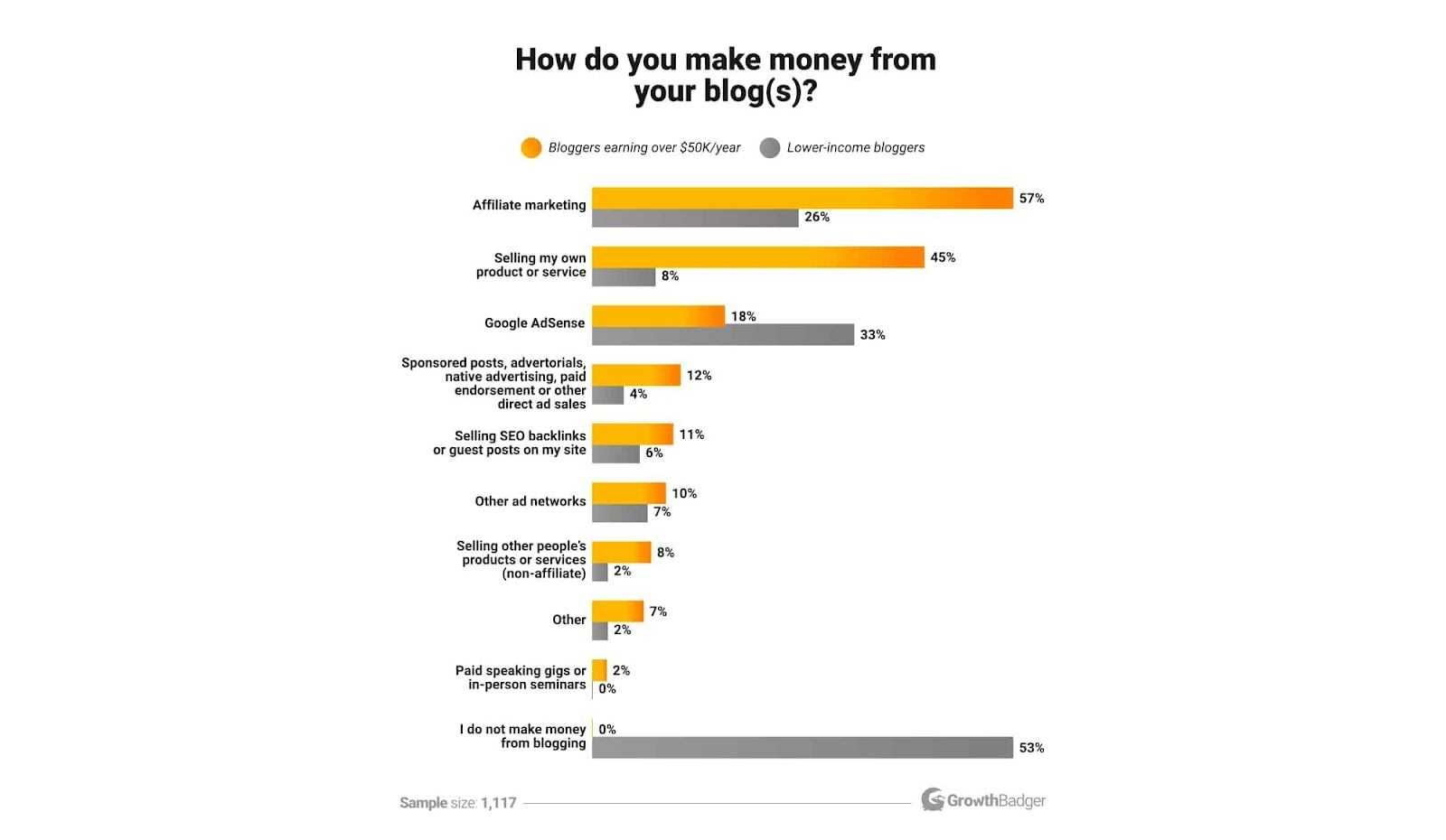
Source: GrowthBadger
Here are effective strategies for a beginner blogger to generate revenue from your blog:
Affiliate marketing
Sell digital products: eBooks, online courses, or printables related to your niche.
Offer services: offer your readers consulting, coaching, or freelance services.
Display Ads: use ad networks like Google AdSense to display ads on your blog. You earn revenue based on clicks (CPC) or impressions (CPM) of these ads.
Sponsored posts: partner with brands or companies to create content about their products or services. They pay you for featuring their content on your blog.
#6. Master Blog SEO
To make money blogging, you need to ensure that your blog content is showing up on Google when people search for content related to yours.
Thus, you need to familiarize yourself with blog SEO.
Blog SEO involves optimizing your blog’s content to rank higher on search engine results pages(SERPs).
The whole process involves performing keyword research, creating quality content, optimizing content for on-page SEO, and generating backlinks from relevant blogs.
If done well, search engine optimization can generate free traffic from search engines.
In fact, according to the Orbit Media survey of over 1,000 bloggers, 66% of respondents say that SEO is their most important source of traffic:
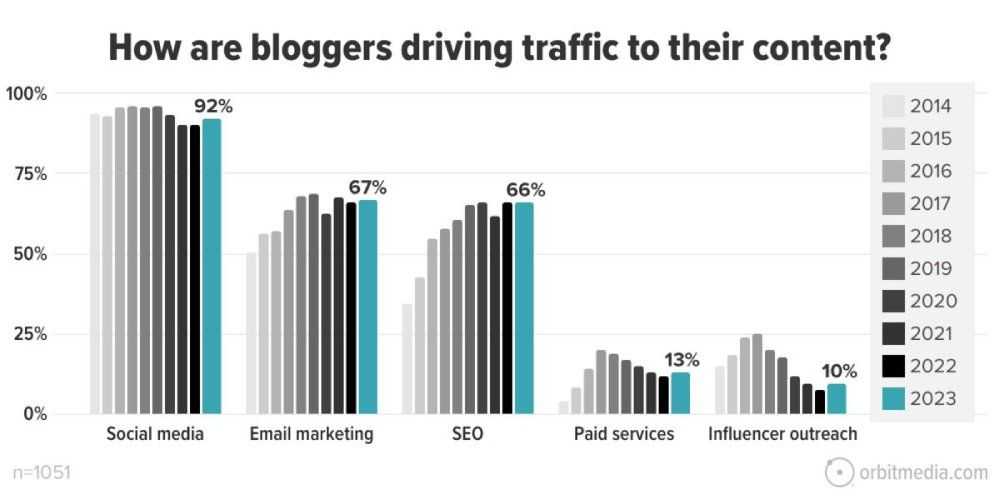
Mastering search engine optimization is one of the most effective blog content writing strategies for novice bloggers for a variety of reasons.
It helps you attract readers who are interested in your content, which can help to:
Expand your blog’s readership
Increase your email subscribers
Establish yourself as an expert in your niche.
Here are blog SEO best practices to follow:
Use keyword research tools like Google Keyword Planner, SEMrush, or Ahrefs. These tools help find relevant keywords and understand their search volume and competition.
Identify one target keyword for each blog post.
Create content around topics that your audience is searching for.
Answer search intent.
Perform on-page SEO by linking to relevant pages of your blog, optimizing images, and creating clean and descriptive URLs.
Build backlinks
#7. Leverage AI Blogging
Many bloggers use AI writing assistants to simplify and enhance their blog writing.
Why?
Because when used correctly, AI tools can help you create content faster than you usually do.
It takes 2-3 hours for bloggers using AI to write a blog post and 3-4 hours for those who don’t use AI.
That’s according to a recent Wordtune survey of over 200 content marketers and blog writers.
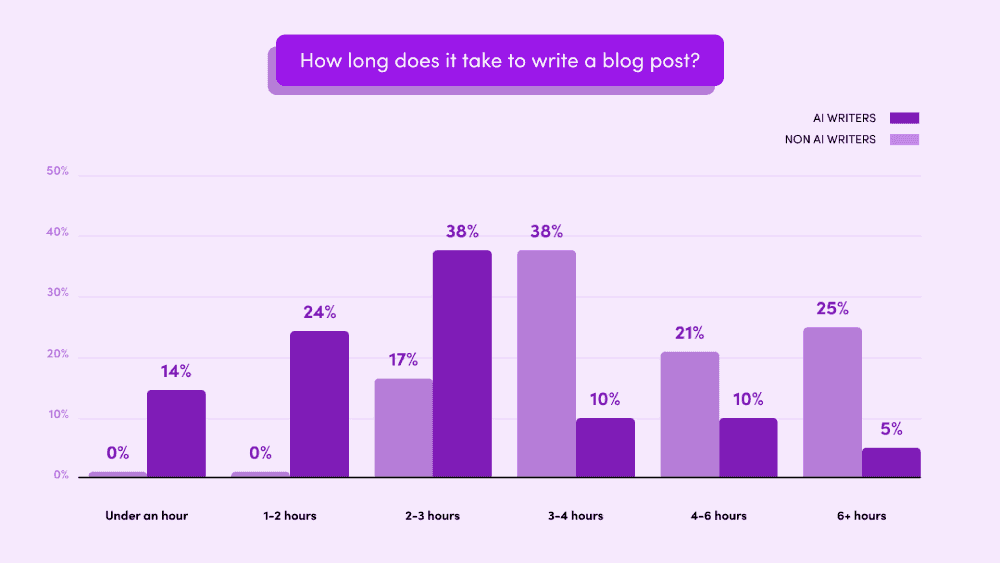
Many bloggers are using AI tools for different purposes.
Here is how most are using the revolutionary tools according to the Orbit Media survey mentioned above:
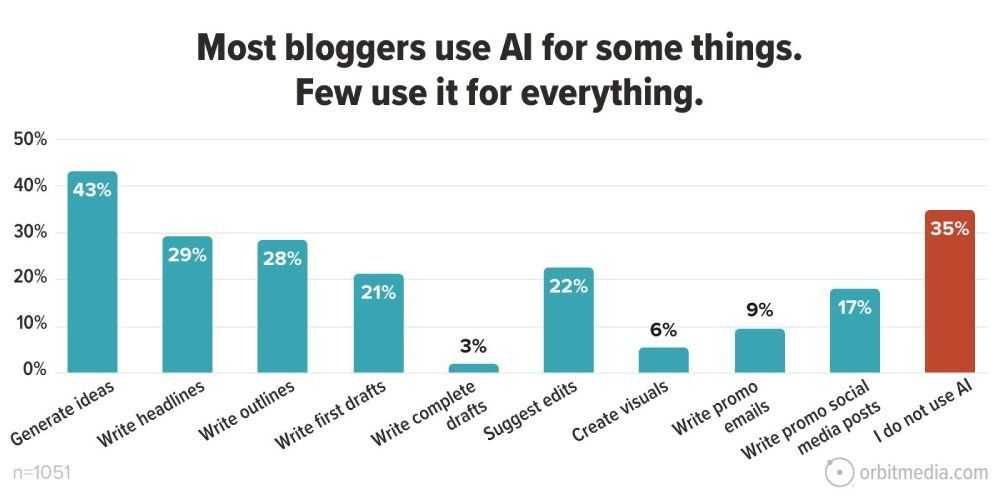
You can also use AI writing tools to craft compelling meta descriptions, research high-ranking keywords, and optimize your blog content for search engines.
The most popular AI tools for bloggers include ChatGPT, Surfer, Grammarly, Jasper, and Wordtune.
#8. Distribute and Promote Your Content Actively
When it comes to content distribution, SEO is a powerful tool to get people to find and engage with your content.
However, it takes time, and competing with established blogs in the SERPs can be a tough task.
Therefore, it’s a good idea to leverage a mix of content distribution channels to grow your long-term and short-term audience.
The content promotion channel you use will depend on your audience.
Here are useful tips to distribute and promote your content effectively:
Share your blog posts on social media- Facebook, LinkedIn, Twitter, Instagram, etc.
Be active on online communities and forums including Reddit and Quora.
Leverage guest blogging: White high-quality guest posts on relevant blogs to gain backlinks and expand your reach.
Networking: Network with other bloggers in your niche.
#9. Monitor The Performance of Your Blog
Lastly, monitor your blog’s performance. Constantly.
Monitoring your blog's performance constantly will help you grow your blog and achieve your goals.
By tracking your blog's metrics, such as traffic, engagement, and conversions, you can see what's working and what's not and make necessary adjustments to your strategy.
Here are some key metrics to track:
Traffic: How many people are visiting your blog? Which pages are the most popular? Where are your visitors coming from?
Engagement: How long are people staying on your blog? How many pages do they visit per session? Do they leave comments?
Conversions: Are people taking the desired actions on your blog, such as subscribing to your email list or signing up for your product or service?
You can use a variety of tools to track your blog's performance, such as Google Analytics, Jetpack, and WordPress Insights.
These tools provide detailed reports on your blog's traffic, engagement, and conversions.
FAQs
Is it necessary to have a blog niche?
Choosing a niche isn’t a must, but I highly recommend it if you intend to make money blogging.
Having a niche will help you focus your content, attract a targeted audience, and become an expert in your field. It will also make it easier to monetize your blog.
What is the best blogging platform for beginner bloggers?
The best platform for beginner bloggers is WordPress. It’s a free and open-source content management system (CMS) that is used by over 43% of all websites on the internet.
It is easy to use and has a wide range of features and plugins that can help you create and grow your blog.
Can I start making money from my blog immediately?
It is unlikely that you will start making money from your blog immediately.
It takes time to build a following and produce high-quality content that is valuable to your audience.
To speed up the blogging process, choose a profitable niche, create high-quality content that is relevant to your target audience, promote your blog on social media and other online channels, build relationships with other bloggers and influencers in your niche, then monetize your blog with advertising, affiliate marketing, or selling your own products and services.
It is also important to be patient and persistent. It takes time to build a successful blog, but it is possible with hard work and dedication.
Conclusion
Now that you have these 9 proven blogging tips, it's time to take action and start blogging!
Blogging is an amazing way to share your knowledge and expertise with the world, connect with people who share your interests, and even make money from your blog.
But it's important to remember that blogging is not a get-rich-quick scheme.
It takes time and effort to build a successful blog. However, if you're willing to put in the work, the rewards can be great.
So what are you waiting for? Implement these tips to start a successful blog today!

Article by:
Chris Wu
Founder at allinblogger.com
Chris Wu is the founder of AllinBlogger, which helps people learn how to make money blogging and start a side hustle business. He is sharing what he has learned about blogging, SEO, marketing, and business on his site. When not working, he loves traveling and photography.
